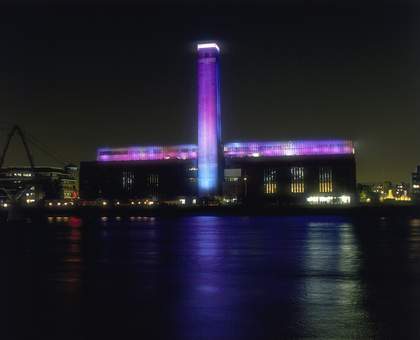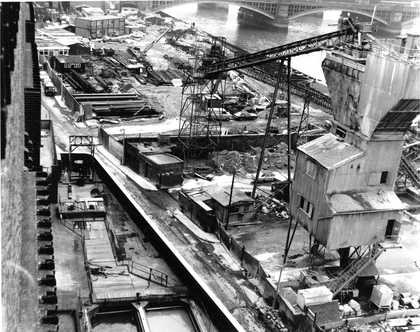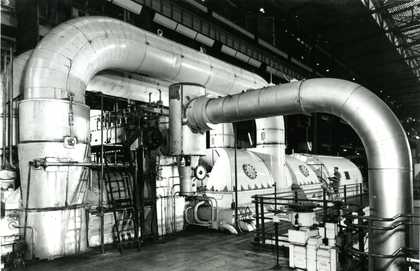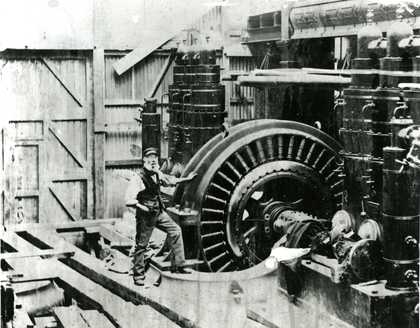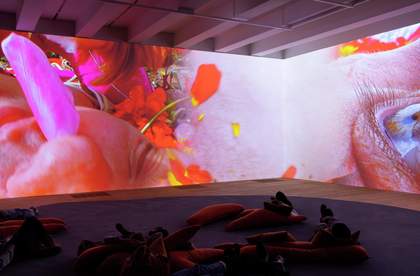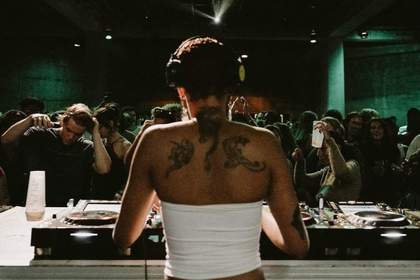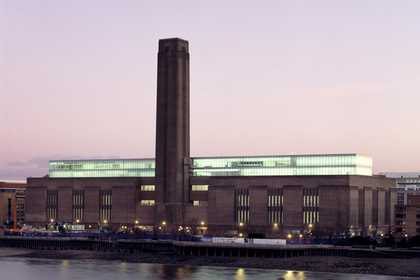1940s–1980s
Sir Giles Gilbert Scott’s architectural plans for Bankside Power Station are unveiled. Construction begins the following year.
The building opens on 7 March 1962. The power station shuts down on 31 October 1981 due to oil price hikes.
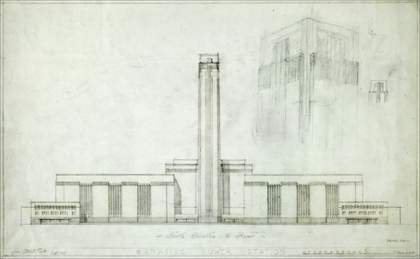
© RIBApix
1992
Tate announces plans to open a new Tate Gallery of Modern Art in London. The search for a suitable site begins the following year.
Various locations are considered, including the south side of Vauxhall Bridge, the Hungerford Bridge car park site on the South Bank, and sites in Docklands, and near King’s Cross and Euston stations.
1994
On 28 April, Bankside Power Station is announced as the site for the new gallery.
Early the following year, architectural firm Herzog & de Meuron are announced as the winners of an international competition for the commission to convert the power station.
1997
Construction begins on 7 October, following the removal of the power station machinery.
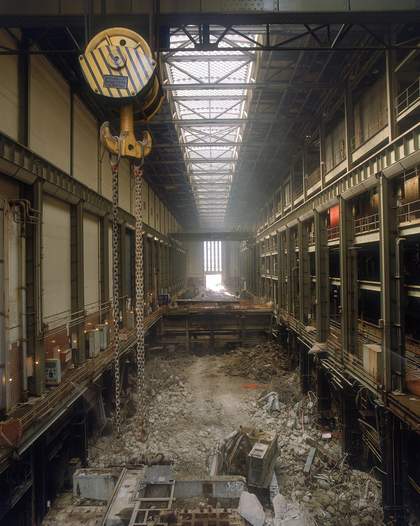
Removal of the power plant's machinery, 1997, photo © Tate
1998
In September a topping-out ceremony marks the placement of the final highest structural element of the building, after which artists’ films are projected onto the façade of the building as the first of a series of temporary art projects.
1999
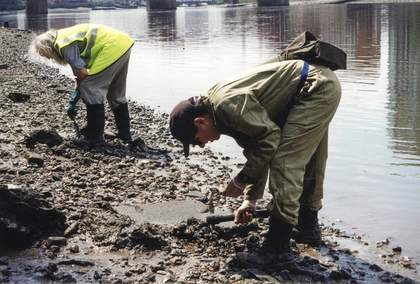
Mark Dion, Tate Thames Dig, photo© Tate
In the summer, artist Mark Dion and a team of local volunteers comb the foreshore of the Thames at Millbank and Bankside for Tate Thames Dig, with the resulting installation becoming part of Tate’s collection.
In October, the new gallery names are announced: Tate Modern and Tate Britain.
2000
Tate Modern opens on 11 May with the first Turbine Hall commission undertaken by Louise Bourgeois, I Do, I Undo and I Redo. Her giant bronze spider, Maman, is the first work to greet visitors.
The first set of free collection displays are organised thematically and transhistorically, regarded as a curatorial innovation.
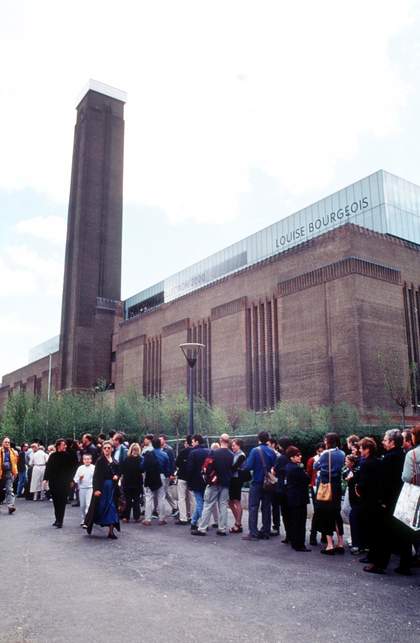
Kathryn Jones/Shutterstock
Performances and a light show are put on to celebrate the official opening, billed as ‘the party of the year’. Guests include Yoko Ono, Tony Blair, Tracey Emin, David Attenborough, Alexander McQueen and Kylie Minogue.
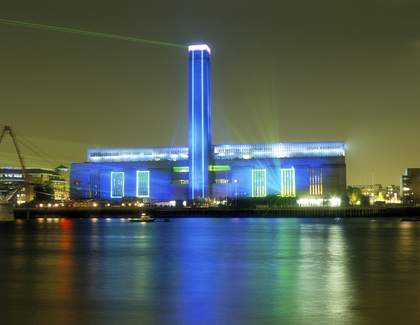
© Tate
2001
The Century City exhibition, which opens in February, explores the relationship between cultural creativity and the metropolis through the lens of nine international cities.
The second Turbine Hall commission, Juan Muñoz’s Double Bind, is viewed by over two million people.
2002
Anish Kapoor’s Marsyas marks the first use of the entire 155-metre length of the Turbine Hall. The artist describes his sculpture’s PVC membrane as being ‘rather like a flayed skin’ – a description that visitors to the most recent Turbine Hall commission by Mire Lee might find resonance with.
The largest ever exhibition of the work of Eva Hesse opens in November.
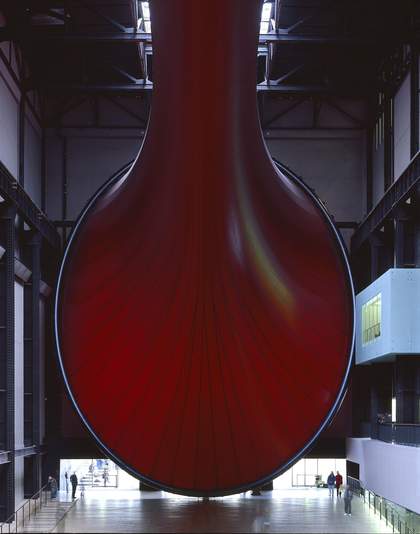
Anish Kapoor, Marsyas, photo © Tate
2003
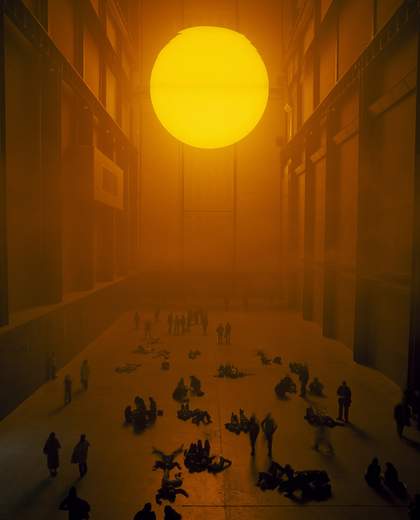
Olafur Eliasson, The Weather Project, photo © Tate
In October, Olafur Eliasson’s The Weather Project opens in the Turbine Hall. Reflecting his atmospheric installation’s popularity with visitors, Eliasson said: ‘I pictured them looking up with their eyes, but they were lying down, rolling around and waving … When President Bush visited London some people arranged themselves on the floor to spell “Bush go home” as a protest.’
In November, the Merce Cunningham Dance Company performs a series of events within the golden glow of the installation.
2004
Bruce Nauman's Turbine Hall commission, Raw Materials, opens in October.
2005
The first major exhibition of Frida Kahlo’s painting in over 20 years (and the first ever in the UK) opens in June.
Rachel Whiteread’s Turbine Hall commission, Embankment, opens in October to great acclaim. As one visitor put it: ‘Everybody loves a box and Rachel’s takes the biscuit.’
2006
The first complete rehang of the free collection displays opens, while Carsten Höller invites visitors to enter the Turbine Hall via one of his five large, spiral slides (including one over 50 metres long).
The artist was interested in both the visual spectacle of people sliding down and the ‘inner spectacle’ of simultaneous delight and anxiety experienced by the sliders. The Times ran a review with the headline: ‘Art – or accident waiting to happen?’
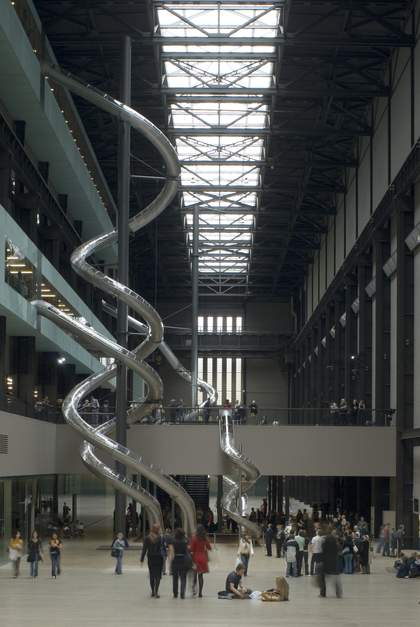
Carsten Höller, Test Site 2006, photo © Tate
2007
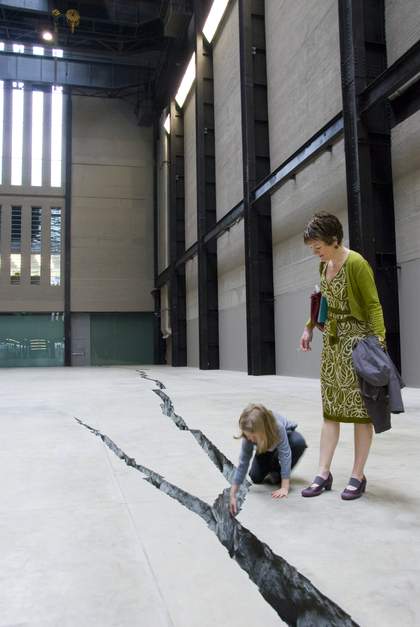
Doris Salcedo, Shibboleth, photo © Tate
The exhibition Hélio Oiticica: The Body of Colour opens, while Doris Salcedo’s Shibboleth appears as an 167-metre crack in the floor of the Turbine Hall – leaving a scar still visible to this day.
Despite speculation over exactly how the crack was achieved, Tate staff remain sworn to secrecy.
2008
Dominique Gonzalez Foerster’s Turbine Hall commission, TH.2058, imagines Tate Modern 50 years into the future, set in a London afflicted by perpetual rain. It features several larger-than-life copies of artworks, including one of Louise Bourgeois’s iconic Maman.
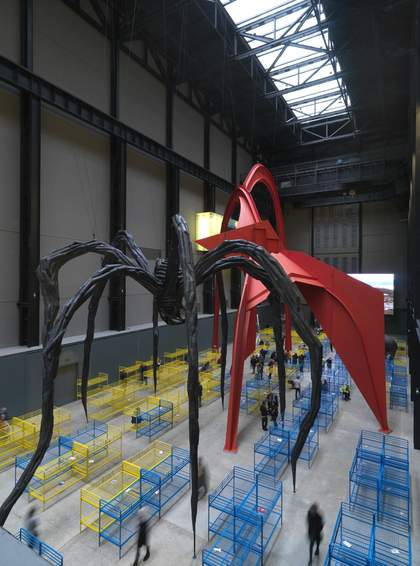
Dominique Gonzalez-Foerster, TH. 2058 photo © Tate
2009
Miroslaw Balka's Turbine Hall Commission, How it is, opens in October.
2010
Michael Clark Company takes up a residency for seven weeks in the Turbine Hall, from July to August.
Ai Weiwei’s Sunflower Seeds are installed in the autumn, a 10-tonne sculpture containing approximately eight million individually handcrafted porcelain sunflower seeds. Visitors were originally invited to walk across the vast field of seeds, but within 48 hours it was cordoned off: the ceramic dust posed a threat to health.
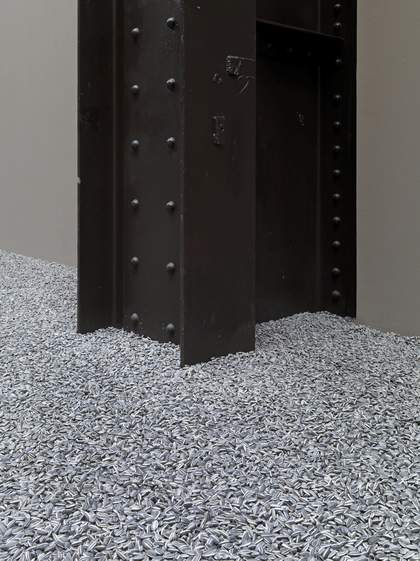
Ai Weiwei, Sunflower Seeds, photo © Tate
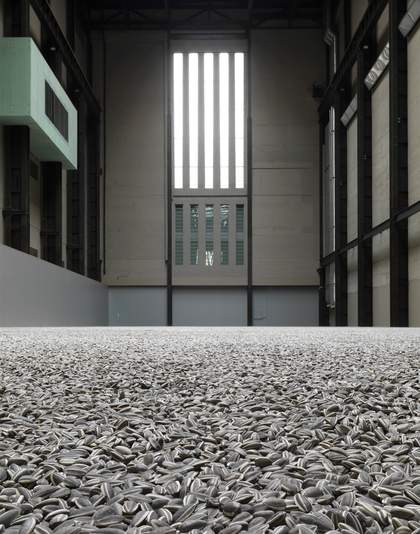
Ai Weiwei, Sunflower Seeds, photo © Tate
2011
Tacita Dean's Turbine Hall commission, FILM, opens in October. It marks the first in the commissioned series to be devoted to moving image.
2012
The Yayoi Kusama exhibition, the largest show of the artist’s work in the UK, opens in February.
In July, following two and a half years of construction work, the Tanks open to the public for the first time with a 15-week programme of live art. Meanwhile, Tino Seghal's Turbine Hall commission These associations opens.
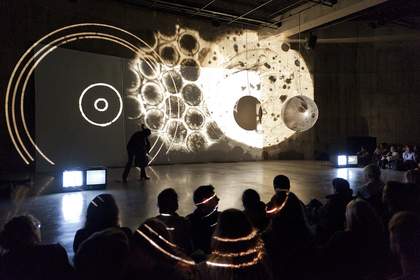
Aldo Tambellini, Black Zero 1965 and Moondial 1966, performed in 2012 in the The Tanks, Tate Modern, Saturday 13 October 2012. Photo: © Tate Photography/Gabrielle Fonseca Johnson, 2012
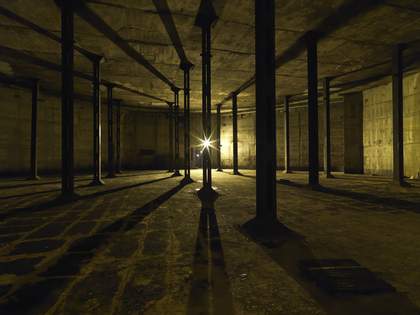
Refurbishment of the Tanks at Tate Modern, Photo © Tate (Marcus Leith and Andrew Dunkley)
2013
This year sees exhibitions of work by Saloua Raouda Choucair, Ellen Gallagher, Meschac Gaba, Ibrahim El-Salahi and Mira Schendel.
Gaba’s 12-room exhibition – the largest work ever bought by Tate – is presented as a museum-within-a-museum, combining the aesthetics of the art gallery with that of a West African marketplace. It will return to Tate Modern as part of its 25th anniversary celebrations.
2014
Henri Matisse: The Cut-Outs becomes the most popular exhibition ever held at Tate Modern and the first to receive over half a million visitors – almost 4,000 each day.
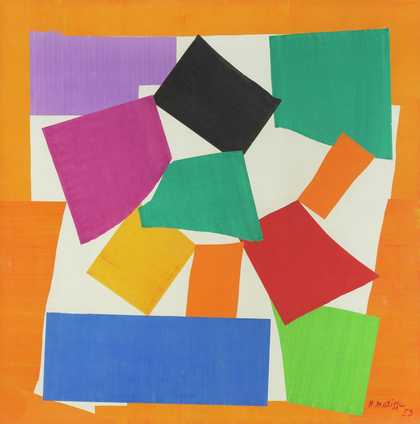
Henri Matisse
The Snail (1953)
Tate
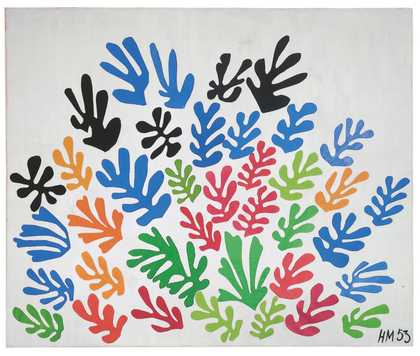
Henri Matisse The Sheaf 1953 Collection University of California, Los Angeles. Hammer Museum© Succession Henri Matisse / DACS 2013
2015
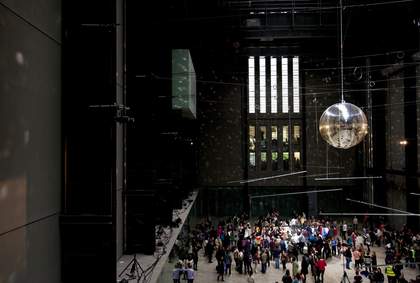
Musée de la Danse, photo © Tate
For one weekend in May, Tate Modern becomes the Musée de la dance (Museum of Dance) with performances led by choreographer Boris Charmatz, including one that transforms the Turbine Hall into a nightclub.
The World Goes Pop, an exhibition retelling the story of pop art from a global perspective, opens later in the year. Abraham Cruzvillegas' Empty Lot opens in October, as this year's Turbine Hall Commission.
2016
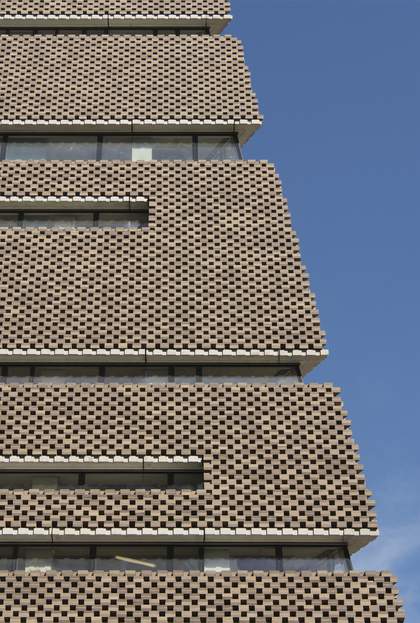
Photo © Tate
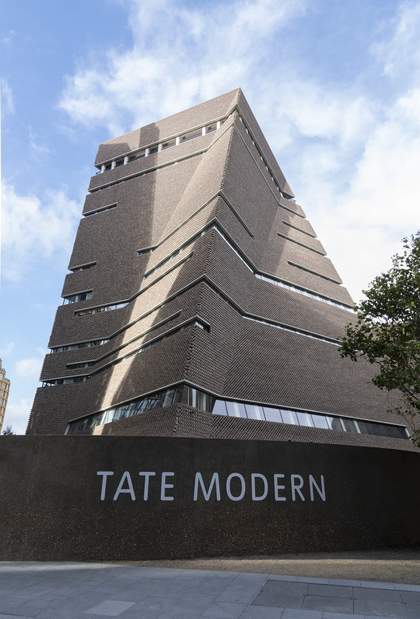
Photo © Tate
On 16 June, 3,000 school children from across the UK become the first members of the public to see the Switch House (now known as the Blavatnik Building), an extension which increases the display space by 60 per cent. Designed by architects Herzog & de Meuron, the new building opens to the general public the following day.
Philippe Pareno's Anywhen opens as the Turbine Hall commission in October.
2017
Soul of a Nation: Art in the Age of Black Power opens on 12 July, while SUPERFLEX’s One Two Three Swing! becomes the first Turbine Hall commission to extend beyond the gallery walls. Comprising dozens of three-seater swings, it proves very popular with Tate’s youngest visitors.
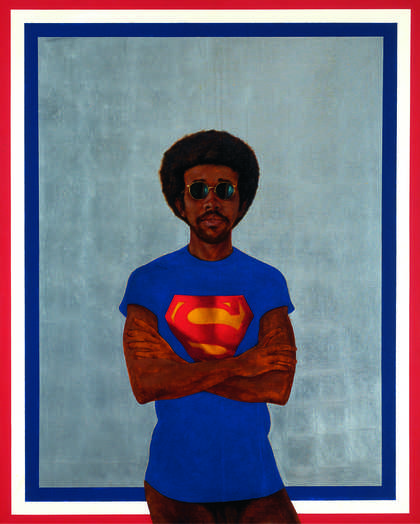
Barkley L. Hendricks Icon for My Man Superman (Superman Never Saved any Black People – Bobby Seale) 1969. Collection of Liz and Eric Lefkofsky © Estate of Barkley L. Hendricks. Courtesy of Jack Shainman Gallery, New York. Superman S-Shield © & ™ DC Comics. Used with permission
2018
In October, Tania Bruguera's Turbine Hall commission entitled 10,148,451 opens in response to the global migration crisis.
2019
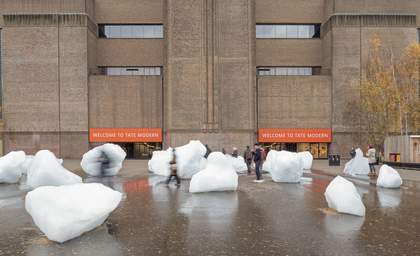
Olafur Eliasson, Ice Watch, photo © Tate
In March, Anne Imhof’s Sex takes over all of the spaces in the Tanks with an architectural installation, choreography and music.
Later, Olafur Eliasson’s exhibition In Real Life raises important environmental issues. As a response to the artists group 'Culture Declares' led by Heather Ackroyd and Dan Harvey, Tate declares a Climate Emergency on 17 July.
Kara Walker's Turbine Hall commission, Fons Americanus, opens in October.
2021
Anicka Yi's Turbine Hall Commission, In Love with the World, populates the Turbine Hall with machines in a vision of a new ecosystem.
2022
This year's Turbine Hall Commission is Cecilia Vicuña's Brain Forest Quipu, which features sculptures made from organic materials.
2023
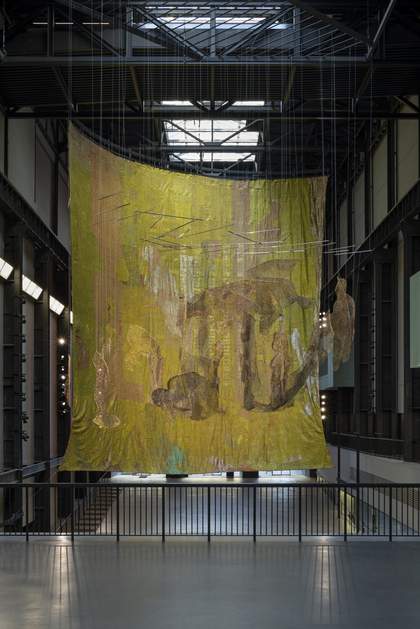
Hyundai Commission: El Anatsui: Behind the Red Moon, Installation View, Photo © Tate (Joe Humphrys)
The long-awaited Philip Guston exhibition opens in the autumn, complemented by El Anatsui’s Turbine Hall commission which repurposes thousands of metal bottle tops to make a monumental, undulating form.
2024
Zanele Muholi, an important survey of the artist’s photography and activism, returns to Tate Modern in June after the original exhibition in the UK in 2020 was cut short by the national COVID-19 lockdowns.
Mire Lee's Turbine Hall Commission, Open Wound, opens in October.
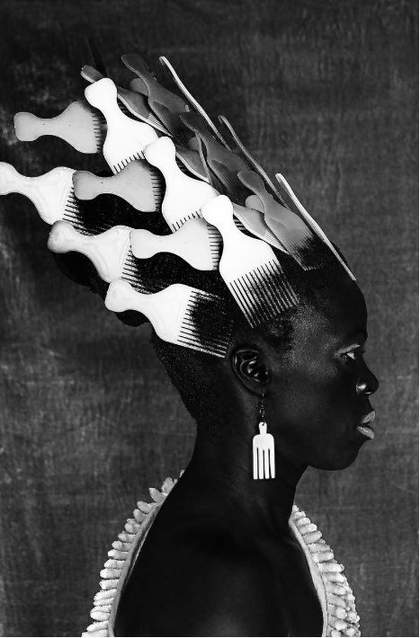
Zanele Muholi Qiniso, The Sails, Durban 2019 © Zanele Muholi Courtesy of the Artist and Yancey Richardson, New York
2025
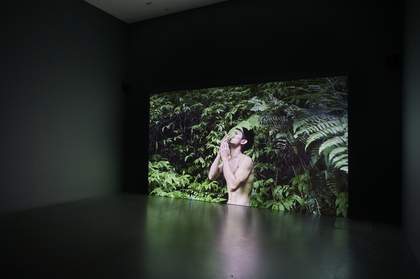
Courtesy the artist, photo © Tate
Gathering Ground, a display featuring international contemporary artworks that are united by a deep connection to land and community, opens in January, and Tate Modern celebrates its 25th birthday.
Since Tate Modern opened in May 2000, 115 million people have visited the art museum.

